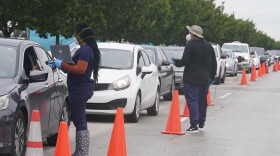
Rob Stein
Rob Stein is a correspondent and senior editor on NPR's science desk.
An award-winning science journalist with more than 30 years of experience, Stein mostly covers health and medicine. He tends to focus on stories that illustrate the intersection of science, health, politics, social trends, ethics, and federal science policy. He tracks genetics, stem cells, cancer research, women's health issues, and other science, medical, and health policy news.
Before NPR, Stein worked at The Washington Post for 16 years, first as the newspaper's science editor and then as a national health reporter. Earlier in his career, Stein spent about four years as an editor at NPR's science desk. Before that, he was a science reporter for United Press International (UPI) in Boston and the science editor of the international wire service in Washington.
Stein's work has been honored by many organizations, including the National Academy of Sciences, the American Association for the Advancement of Science, the American Association for Cancer Research, and the Association of Health Care Journalists. He was twice part of NPR teams that won Peabody Awards.
Stein frequently represents NPR, speaking at universities, international meetings and other venues, including the University of Cambridge in Britain, the World Conference of Science Journalists in South Korea, and the Aspen Institute in Washington, DC.
Stein is a graduate of the University of Massachusetts, Amherst. He completed a journalism fellowship at the Harvard School of Public Health, a program in science and religion at the University of Cambridge, and a summer science writer's workshop at the Marine Biological Laboratory in Woods Hole, Mass.
-
The massive U.S. omicron surge appears to be following the same pattern as other countries, with infections starting to peak and quickly recede. But cases are still spiking in some parts of the U.S.
-
Researchers say signs are emerging that the omicron surge may have begun to peak in some parts of the country, and could peak nationally quickly. Others are more cautious.
-
Some infectious disease experts think there may be something of a silver lining with the omicron surge. It may leave a blanket of enhanced immunity that leaves the virus easier to live with.
-
The question of what fully vaccinated means might be changing as booster shots are becoming more important. More data, and new policies, are emerging in the U.S. and around the world.
-
A young Mississippi woman is thriving two years after getting treated for sickle cell disease with the revolutionary gene-editing technique known as CRISPR.
-
University of Washington research predicts the omicron wave will infect more than 400,000 people a day in the U.S. when it crests in about six weeks.
-
The omicron variant is now the dominant variant in the U.S. President Biden is set to warn Americans about omicron, and talk about the administration's plans to help areas struggling with the surge.
-
Scientists are projecting the surge will peak in January. Just how massive it could be depends on how quickly Americans get boosted and change behavior to slow the spread.
-
First projections of the variant's impact find a range of possibilities, from just a relatively small acceleration of the current trajectory to a big new wave that could rival last winter's surge.
-
The Moderna vaccine's ability to shield against infection drops sharply when tested on the omicron variant. But getting a booster pumps the protection back up again, new research suggests.
-
The coronavirus has now killed more than 800,000 people in the U.S., more deaths than any other country has reported. The U.S. also leads the world in diagnosed cases with more than 50 million.
-
President Biden announced his strategy to deal with COVID-19 throughout the winter months, including getting more people vaccinated and stepping up testing for the virus.




